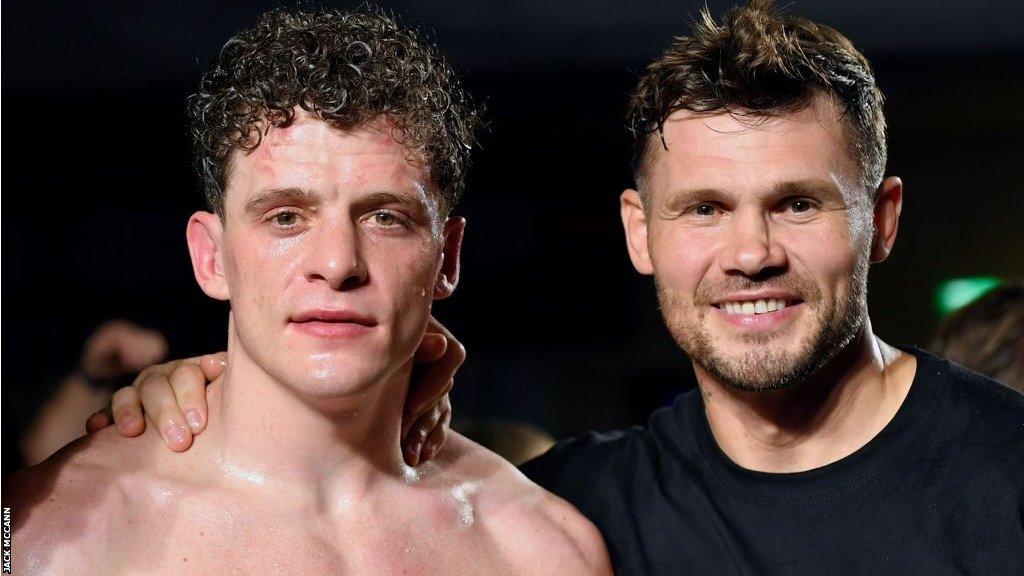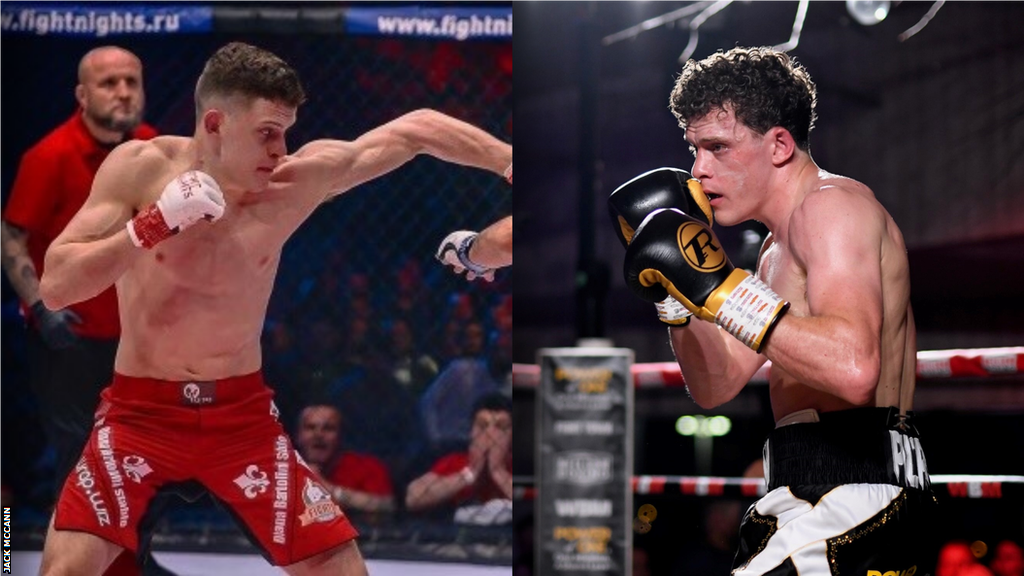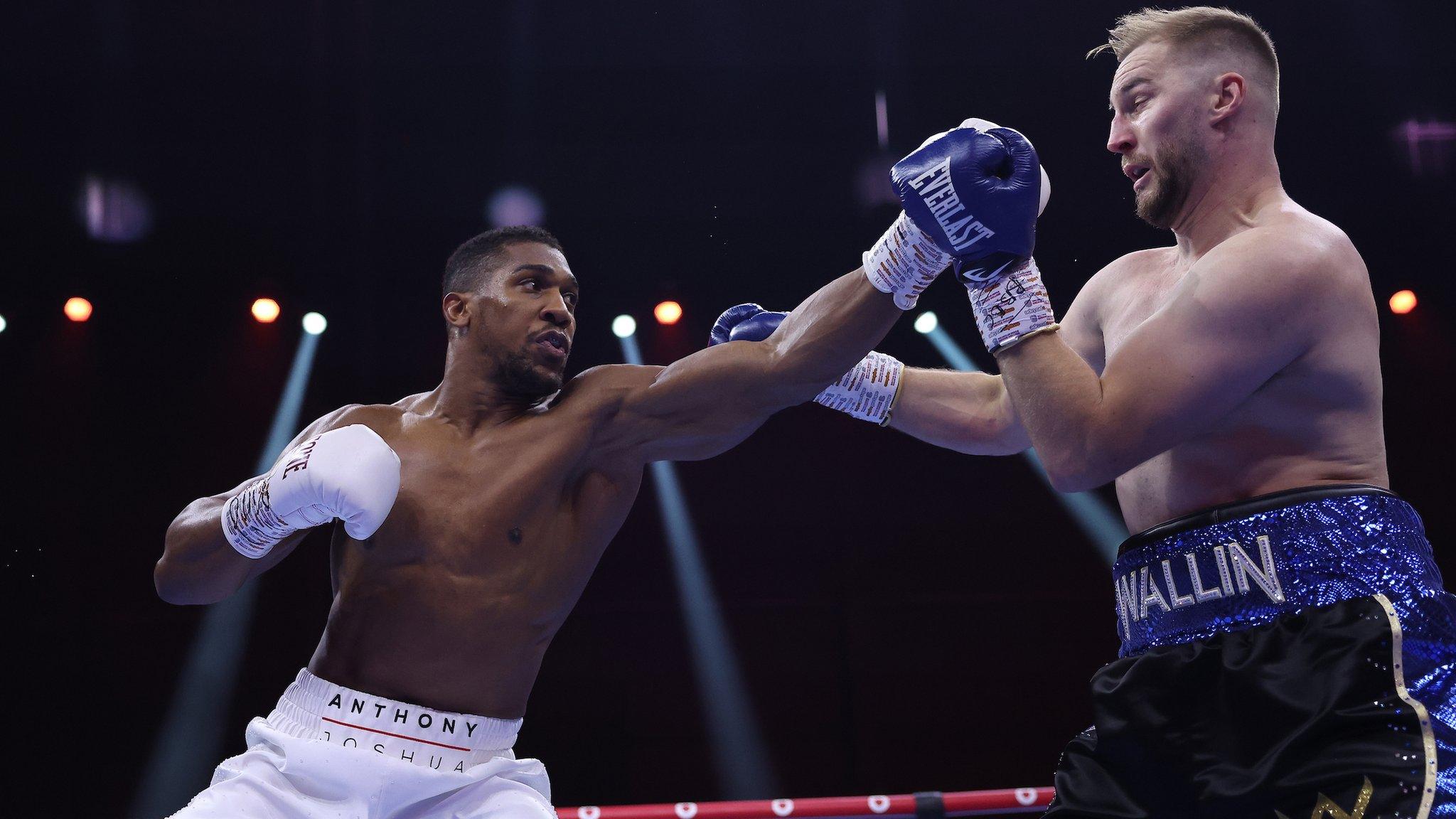Small Hall Spotlight: Boxing or MMA - Liverpool's Jack McGann on making the switch
- Published

Jack McGann (L) is trained by former boxer Martin Murray
It is a debate which rages back and forth on social media - which is better, boxing or mixed martial arts? Top events in both sports regularly achieve millions of views, while the popular perception is that MMA has a younger fanbase.
So, what are the pros and cons of each? Boxing may have the history, but will MMA win the future?
Seeking definitive answers, BBC Sport caught up with Liverpool light-middleweight, Jack 'the Pilgrim' McGann, a fighter better placed than almost anyone to comment.
Currently undefeated in eight as a professional boxer, McGann was formerly an MMA fighter. He racked up eleven wins in 16 fights between 2012 and 2017, before switching codes.
"I love both sports," the 29-year-old explains. "But they're as different as night and day.
"Boxing is more damaging, in my opinion. I had plenty of MMA fights where both fighters came out at the end without a scratch. If you're wrestling most of the time, that's how it is.
"In MMA, you also get lulls in fights, where you're pressed up against the cage or one fighter has the other's back but can't submit them, and you take a little breather.
"That doesn't happen in boxing. So, although the rounds are shorter [MMA uses five-minute rounds], it feels more intense."
Russian horror shows inspires boxing switch
McGann's childhood meant he was always destined to end up in MMA. His father, Anthony McGann was the owner and founder of the legendary Wolfslair gym in Widnes.
It's storied past includes a roll call of champions that includes the UK's first UFC champion Michael Bisping and fellow legends Quinton 'Rampage' Jackson and Cheick Kongo.
While still a scrawny, primary school kid, McGann would train at his father's gym, alongside guys who went on to become icons.
Sometimes fighters would even sleep at his house, while preparing for contests. McGann casually recalls Jackson moving in for an extended spell.
So, what would make someone groomed for MMA almost from birth, who then built a solid, winning record, leave it for boxing in their mid-twenties?
Others, like Conor McGregor, may have switched for one-off events, but did not completely transition careers. Too many tribalists out there on the internet, the move could almost be seen as a defection.
"I love combat sports in general, but it was always the striking side of MMA which came most naturally to me. Kicks, knees, and of course, punches," McGann says.
"In the cage, I was a stand-up fighter and if the fight went to the floor, my tactics were to find a way to get my feet again as soon as possible."
But that's not to say it was straightforward to switch over. When McGann moved to boxing, at 24, he had no previous experience in it beyond sparring in the gym.
"I had competed in kickboxing, jujitsu, all of that. I even had a spell out in Thailand when I was 19, just training and fighting Muay Thai for four months, which gave me a new perspective on things. But boxing? Nothing," he says.
This meant that to qualify for his pro boxing license, McGann had to box four rounds with former world title challenger Martin Murray behind closed doors in front of British Boxing Board of Control officials.

McGann began his combat sports career in MMA
He passed and Murray later became his trainer.
However, the abrupt career change still raised eyebrows, not least because McGann had once been considered a rising star of MMA.
He clocked seven straight wins from his debut onwards, under the guidance of coach Aaron Wilkinson, before suffering a points defeat to Marc Diakiese.
Diakiese now competes in the UFC, the goal for many MMA fighters.
"Of course, the UFC was my aim too," McGann recalls, but explains how a rough path pushed him into boxing.
"After the Diakiese defeat, in 2015, I got picked up by the Fight Nights Global organisation and was fighting out in Russia.
"They were huge shows, in big arenas, but I suffered a very poor home-decision loss to a Russian kid in my fourth fight out there.
"Then, in my last fight with them, they had me standing on a platform during my walk-out, with lasers going off around me, but the platform collapsed.
"I fell and injured my leg, went ahead and fought anyway, and lost. I later found out I had chipped the bone in my shin.
"So that meant I had two defeats on the bounce and had misgivings about the organisation. From there, I started weighing up my options. That's what led to boxing."
Politics, purses and principles
Now preparing for his ninth pro boxing contest, McGann reflects on the demands of his new and old disciplines.
"You have to fight for something besides money," he stresses, explaining why he competes as an ambassador for the 'Power of One' animal rights charity, a commitment which arose from his time in Thailand, where he witnessed animal mistreatment.
"But money still matters. When I switched over, it was like a breath of fresh air.
"But there's so much politics in boxing with all the organisations, promoters and broadcasters. In MMA, the best fight the best because they're all in the UFC. It's simple.
"In boxing that doesn't happen, which upsets fans but means that boxers are in a stronger bargaining position.
"If one promoter doesn't offer the right deal, you go to another. That's why top boxers make more money.
"For fans, the four-ounce gloves and rules in MMA mean you get more knockouts, which they find exciting. So, I guess you could argue that, structurally, MMA is better for fans but boxing is better for fighters."
Despite this contrast, McGann does not want or expect to see a future in which one sport dominates the other.
"I hope both thrive," he says. "Boxing suits me beautifully now, but my dream is to win a world title, then maybe get a fight in the UFC.
"I would still truly love to do that."
Related topics
- Published14 January 2024
